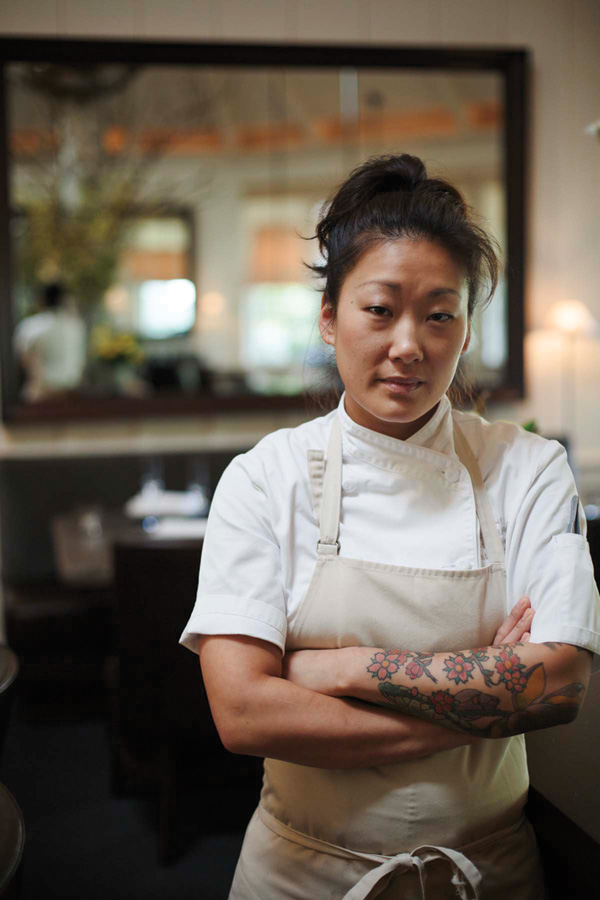by SEUNG Y. LEE
Katianna Hong showed a keen interest in cooking from an early age.
As a young girl, she hung around the home of a neighbor who loved to cook and grill. She would patiently observe and assist in the preparation of his meals.
After school or on weekends, she would beg her mother to drive her to the Asian grocery stores in Albany, N.Y.—a 30-minute drive south from their home in Saratoga County—to buy jars of kimchi and ingredients so she could make Korean dishes.
And at home, she frequently turned the TV set to cooking shows, enamored with such chef stars as Rachel Ray or Mario Batali on a then-brand new Food Network.
“This is when cooking channels were just getting started,” says her mother, Kathy Weiner, who, with husband Neil, adopted Hong as a 3-monthold from South Korea.
Hong’s early love of cooking followed by years of hard work, perseverance and a redirected energy once spent exhaustively searching for her birth roots have today placed the 31-year-old in a rare position in the culinary world—as the first female chef de cuisine at a three-star Michelin restaurant in the U.S.
In April, Hong became the kitchen’s second-in-command at The Restaurant at Meadowood, an innovative modern American restaurant in Napa Valley led by executive chef Christopher Kostow, a 2013 James Beard Foundation Award recipient.
“I dreamt of being a sous chef, then maybe becoming a chef de cuisine one day,” Hong says in a phone interview with KoreAm. “Usually when you cook, you move onto different restaurants to experience different things. That’s how you learn. But when you do stick around for multiple years, you hope this is the right place at the right time to one day become chef de cuisine.”
 (Photos by Bonjwing Lee/courtesy of the Restaurant at Meadowood)
(Photos by Bonjwing Lee/courtesy of the Restaurant at Meadowood)
At Meadowood, located on a luxury estate in St. Helena, Calif., Hong started near the bottom of the ladder, working at nearly every station in the kitchen. It’s where she met husband John, a sous chef at the restaurant, whom she married in January, taking his surname.
As a child growing up in suburban Clifton Park in upstate New York, a place where few Koreans resided, Hong sought to get closer to her roots. She felt detached from her biological side and sought multiple times to reconnect with her birth family in South Korea.
In the early 1990s, the number of families with an adopted child from South Korea prompted the tiny Korean American community in Albany to host a summer camp for adoptees, which offered traditional Korean activities and classes.
It was at Camp Mujigae (“rainbow” in Korean) where Hong could connect with her heritage. It was at Camp Mujigae where she learned to make Korean dumplings. And it was the food that left the strongest impression on her, so much so that, by elementary school, she was preparing bulgogi for her parents and older brother for family dinners.
“Wherever she got her talents for cooking, I don’t think it came from us,” says her mom, in a phone interview. Family meals rarely involved much culinary exploration beyond the occasional matzo ball soup for the Jewish holidays or an Irish roast. Cooking at the Weiner household was more a utilitarian task than an expression of artistic experimentation.
 Hong with her older brother Reid. (Photo courtesy of the Weiner family)
Hong with her older brother Reid. (Photo courtesy of the Weiner family)
Hong’s experience at Camp Mujigae did more than just introduce her to the world of Korean food and culture; it sparked a desire to learn more about her Korean identity.
This longing hit its peak during her pre-teen years. Hong visited Korea for the first time when she was 13 with her aunt, retracing the first three months of her life. She visited her birthplace in a rural village in South Chungcheong Province in hopes of finding her biological mother. She came back with more questions than answers.
Upon returning to the U.S., Hong contacted the adoption agency that brought her here as an infant, but it was unable to track down her birth mother. Changes were rapidly swirling around Hong during this time. A once-competitive gymnast, she had to give up the sport she loved and devoted thousands of hours toward since she was a toddler due to an injury. Her dreams of becoming an Olympic gymnast were dashed.
Without gymnastics, which provided a pillar of stability for Hong, teenage rebellion stirred within her. She was no longer paying attention and excelling in school. For the first time in her life, she felt like an outsider in her own home.
“It was a point in my life when I lost focus, had issues with my parents and was just angry about everything,” she says. “I imagined I had this great family in Korea, and that my birth mom was young and beautiful and would be totally understanding of me. I glorified it for sure.”
After graduating high school, Hong attended Manhattan College in the Bronx but dropped out after a semester and returned home; the classroom setting was too suffocating. As she tried to figure out her future in Clifton Park, she got a job with a local catering company, which helped her rediscover her love for cooking.
She soon attended a local culinary school before transferring to the Culinary Institute of America in Hyde Park, N.Y. She honed her craft in the kitchens of renowned restaurants in Los Angeles and Las Vegas, including B&B Ristorante at The Venetian, owned by one of her childhood cooking idols, Mario Batali.
At Meadowood, a place Hong has spent the last five years, she has found a rhythm that’s earned her praise and accolades.
 From left to right: John Hong, Katianna Hong, Kathy Weiner, Christopher Kostow and Neil Weiner at Meadowood in St. Helena, Calif. (Photo courtesy of the Weiner family)
From left to right: John Hong, Katianna Hong, Kathy Weiner, Christopher Kostow and Neil Weiner at Meadowood in St. Helena, Calif. (Photo courtesy of the Weiner family)
“This is a kitchen with a lot of moving parts,” executive chef Kostow told the San Francisco Chronicle in April. “There’s just a lot that goes into the restaurant [and] Kat has an intrinsic understanding of where the restaurant is going, and where it needs to go.”
Hong attributes her professional strides to her endless energy and fierce competitive nature, honed from a work ethic developed in her elementary school years when she was training for gymnastics on a daily basis.
“I like the schedules and the frenzy in the kitchen,” she says. “I’m a very driven person, and I just love the challenge given to me and my staff every day.”
And despite falling short of finding her biological family, she has discovered a new Korean connection through her husband. Their wedding incorporated a traditional Korean ceremony and the couple occasionally makes the drive from their home in Napa Valley to L.A., where John’s family lives, to spend a weekend partaking in Korean food.
Hong’s parents feel the marriage helped tie many of the loose ends their daughter has been carrying around her entire life. “John has been a godsend for Katy,” says her father, Neil. “Through him, I think she found some peace.”
 Katianna and John Hong perform a traditional Korean ceremony during their wedding earlier this year. (Photo courtesy of the Weiner family)
Katianna and John Hong perform a traditional Korean ceremony during their wedding earlier this year. (Photo courtesy of the Weiner family)
A few years ago, accompanied by her then-fiancé, Hong revisited South Korea, but this time for a different purpose. The couple toured around the country, visiting the provinces and trying out the diverse palate of Korean cuisine.
Of all the numerous countries she has visited on business to meet foreign chefs and sample new recipes to bring back to Meadowood, Hong says her second trip to South Korea was one of her favorites—it offered the right blend of personal significance and culinary adventure for a chef who is no longer searching for her birth mother.
Only after she made peace with her past did she reconnect with her homeland through food—the language she knows best.
___
This article was published in the June/July 2015 issue of KoreAm. Subscribetoday! To purchase a single issue copy of the June/July issue, click the “Buy Now” button below. (U.S. customers only. Expect delivery in 5-7 business days).







